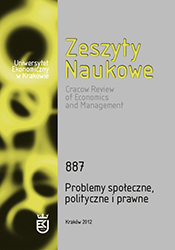Uchwały Sądu Najwyższego i ich rola w zachowaniu jednolitości sądowej wykładni prawa
Supreme Court Resolutions and Their Role in Ensuring the Uniformity of the Application of Law in Court Decisions
Author(s): Piotr WiatrowskiSubject(s): Law, Constitution, Jurisprudence
Published by: Wydawnictwo Uniwersytetu Ekonomicznego w Krakowie
Keywords: interpretation of the law; resolution of the Supreme Court; question on a point of law; Supreme Court
Summary/Abstract: Resolutions made by the Supreme Court that grow out of answers concerning concrete and abstract legal questions are fundamental instruments used to ensure the uniform application of law in court decisions. Legal questions are admissible only when divergence occurs in the interpretation of legal provisions in the practice of their application, they are apparently incorrectly worded and/or unclearly formulated, allowing different interpretations when the formulations are used by the legislator in an inaccurate way, or they are ambiguous or comprise too wide a scope of regulation regarding their ratio legis. Also, divergence in the application of provisions in jurisdiction may be grounds for posing an abstract legal question, which may result in courts issuing different decisions on the basis of the same provisions, or even the same decisions, but ones resulting from different interpretations. The obligation to comply with such a resolution in a particular case does not violate the principle of independence of the judiciary in judgments, hence the court itself has the initiative regarding its issuance from the outset. The opinion represented in the resolution is not to be accepted universally. Nor is it binding for the courts, and consideration of the opinion involved in the resolution in other cases is to be predicated on the acceptance of its substantive value.
Journal: Zeszyty Naukowe Uniwersytetu Ekonomicznego w Krakowie
- Issue Year: 887/2012
- Issue No: 11
- Page Range: 73-86
- Page Count: 14
- Language: Polish

